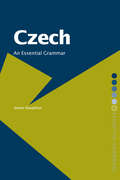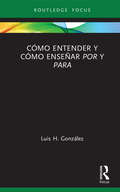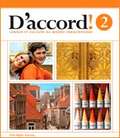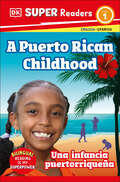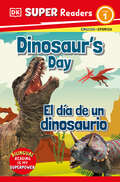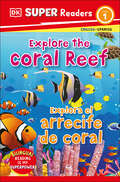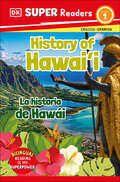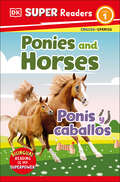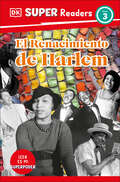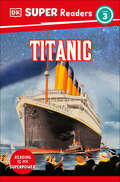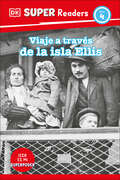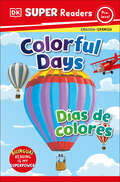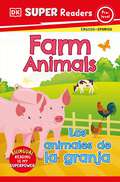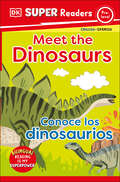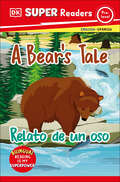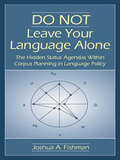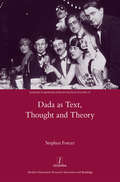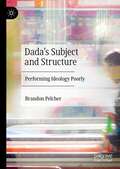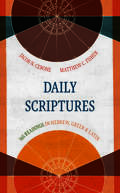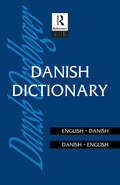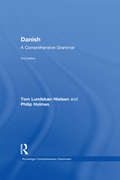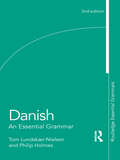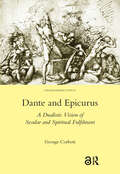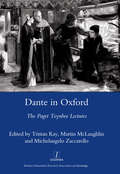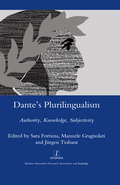- Table View
- List View
Czech: An Essential Grammar (Routledge Essential Grammars)
by James NaughtonCzech: An Essential Grammar is a practical reference guide to the core structures and features of modern Czech. Presenting a fresh and accessible description of the language, this engaging grammar uses clear, jargon-free explanations and sets out the complexities of Czech in short, readable sections. Suitable for either independent study or for students in schools, colleges, universities and adult classes of all types, key features include: * focus on the morphology and syntax of the language* clear explanations of grammatical terms * full use of authentic examples* detailed contents list and index for easy access to information. With an emphasis on the Czech that native speakers use today, Czech: An Essential Grammar will help students to read, speak and write the language with greater confidence.
Cómo entender y cómo enseñar por y para
by Luis H. GonzálezCómo entender y como enseñar por y para explora muchos de los problemas que los profesores/as encuentran cuando enseñan el uso de estas dos preposiciones. Este libro proporciona un marco de referencia para la comprensión de las sutilezas entre las dos preposiciones, de manera que los profesores/as podrán ayudarles a los estudiantes a aproximarse a la manera cómo los hablantes nativos/as escogen intuitivamente cuál usar en cualquier situación. Este libro muestra con ejemplos de cuatro autores/as distintos que una regla de punto final intencional (destino, fecha límite, meta, objetivo, propósito, recipiente o uso) explica el 95% de los usos de para. Trescientos ejemplos de Corpes XXI y otros 262 ejemplos de tres novelas distintas muestran que dos reglas (causa e intervalo de espacio/de tiempo) explican el 80% de los usos de por. En este libro no se ejemplifican las reglas; más bien, se formulan desde abajo las reglas necesarias para explicar más de 600 ejemplos auténticos de por o para de novelas y de Corpes XXI. Diseñado para los profesores/as de español como segunda lengua, el procedimiento de construcción de las reglas delineado en el libro mejorará la manera cómo se les enseñará a los estudiantes por y para. Además, las conexiones hechas a través del libro servirán como un modelo para entender mejor otras dicotomías de la gramática del español.
DK Super Readers Level 1 Bilingual A Puerto Rican Childhood – Una infancia puertorriqueña (DK Super Readers)
by DKUse your bilingual reading powers to learn all about childhood in Puerto Rico with this fascinating nonfiction reader – carefully leveled to help children progress.A Puerto Rican Childhood – Una infancia puertorriqueña is a beautifully designed reader all about the life of a child growing up in Puerto Rico, including fascinating details about the island’s landscape, history, food, animals, pastimes and more. The engaging text has been carefully leveled using Lexiles so that children are set up to succeed. A motivating introduction to using essential nonfiction reading skills in Spanish and English. Children will love to find out about Carmen’s life and childhood on the Caribbean Island of Puerto Rico.
DK Super Readers Level 1 Bilingual Dinosaur’s Day – El día de un dinosaurio (DK Super Readers)
by DKA day in the life of a Triceratops! Make reading in Spanish and English your superpower with DK&’s beautiful, leveled nonfiction.Use your bilingual reading superpowers to learn all about what happens to a Triceratops when he meets a fierce Tyrannosaurus - a high-quality, fun, nonfiction reader - carefully leveled to help children progress.Dinosaur&’s Day - El día de un dinosaurio is a beautifully designed reader all about a day in the life of a Triceratops - and its scary encounter with a deadly Tyrannosaurus!The engaging text has been carefully leveled using Lexile so that children are set up to succeed. A motivating introduction to using essential nonfiction reading skills in Spanish and English. Children will love to find out about the Triceratops, the Tyrannosaurus, and other dinosaurs.
DK Super Readers Level 1 Bilingual Explore the Coral Reef – Explora el arrecife de coral (DK Super Readers)
by DKMeet the sea creatures living on a coral reef! Make reading in English and Spanish your superpower with DK&’s beautiful, leveled nonfiction.Use your bilingual reading superpowers to learn all about a beautiful coral reef and the sea animals living there - a high-quality, fun, nonfiction reader - carefully leveled to help children progress. Explore the Coral Reef - Explora el arrecife de coral is a beautifully designed reader all about the fish and other sea animals living on a coral reef. The engaging text has been carefully leveled using Lexile so that children are set up to succeed. A motivating introduction to using essential nonfiction reading skills in Spanish and English.Children will love to find out about the beautiful coral reef and all the sea animals that can be spotted on it.
DK Super Readers Level 1 Bilingual History of Hawai'i – La historia de Hawái (DK Super Readers)
by DKHelp your child power up their reading skills and learn all about this American island state in the Pacific Ocean with this fun-filled nonfiction reader–carefully leveled to help children progress.DK Super Readers Level 1: History of Hawaii will introduce kids to the history of this unique American state—and is a motivating introduction to using essential nonfiction reading skills, proving ideal for children ready to enter the riveting world of reading. DK Super Readers take children on a journey through the wonderful world of nonfiction: traveling back to the time of dinosaurs, learning more about animals, exploring natural wonders and more, all while developing vital nonfiction reading skills and progressing from first words to reading confidently. The DK Super Readers series can help your child practice reading by:- Covering engaging, motivating, curriculum-aligned topics.Building knowledge while progressing core Grade 1 and 2 reading skills.- Developing subject vocabulary on topics such as inventions, inventors, and history.- Boosting understanding and retention through comprehension quizzes.Each title, which has been leveled using MetaMetrics®: The Lexile Framework for Reading, integrates science, geography, history, and nature topics so there’s something for all children’s interests. The books and online content perfectly supplement core literacy programs and are mapped to the Common Core Standards. Children will love powering up their nonfiction reading skills and becoming reading heroes. DK Super Readers Pre-level titles are visually engaging and expand subject knowledge and vocabulary for young readers who want to learn more about the world around them. Perfect for children ages 6 to 8 (Grades 1 and 2) who are learning to read with help.
DK Super Readers Level 1 Bilingual Ponies and Horses – Ponis y caballos (DK Super Readers)
by DKPonies and horses are favorite animal friends. Make reading your superpower with DK&’s beautiful, leveled nonfiction.Use your reading superpowers to learn all about ponies and horses - a high-quality, fun, nonfiction reader - carefully leveled to help children progress. Ponies and Horses is a beautifully designed reader all about these favorite animal friends. The engaging text has been carefully leveled using Lexile so that children are set up to succeed. A motivating introduction to using essential nonfiction reading skills. Children will love to find out about all different kinds of ponies and horses; how to look after them; amazing sports with horses; and even wild horses.
DK Super Readers Level 3 El Renacimiento de Harlem (DK Super Readers)
by DKAyude a su niño a fortalecer sus destrezas de lectura y aprender acerca de las vidas, música, arte e ideas emocionantes que florecieron en la comunidad afroamericana de Harlem hace cien años con este texto informativo repleto de datos verídicos y graduado cuidadosamente para apoyar el progreso de los pequeños lectores.¿Cómo era el Harlem afroamericano de la década de 1920, con su explosión de nuevas ideas, música, arte y estilo?Un texto cautivador graduado cuidadosamente con el sistema Lexile para proveerles a los niños lo que necesitan para encarar con éxito la lectura.Una introducción motivadora al uso de las destrezas básicas para la lectura de textos informativos.A los niños les encantará aprender sobre la creatividad y los logros de la comunidad afroamericana durante el increíble lugar y momento conocido como "el Renacimiento de Harlem".- - - - - - - - - - - - - -Help your child power up their reading skills and learn about the exciting lives, music, art and ideas of the African American community of Harlem 100 years ago in this fact-filled-nonfiction reader—carefully leveled to help children progress.What was it like in the African American Harlem of the 1920s, bursting with new ideas, music, art, and style?The engaging text has been carefully leveled using Lexile so that children are set up to succeed.A motivating introduction to using essential nonfiction reading skills.Children will love to find out about the creativity and achievements of the African American community during the incredible place and time known as the ‘Harlem renaissance’.
DK Super Readers Level 3 El Titanic (DK Super Readers)
by DKHelp your child power up their reading skills and learn all about a family's journey on board the Titanic with this fact-filled nonfiction reader—carefully leveled to help children progress. Will and Lucy Tate and their family set sail for America. But they are on board the Titanic, the "unsinkable" ship, which is heading for disaster! The engaging text has been carefully leveled using Lexile so that children are set up to succeed. A motivating introduction to using essential nonfiction reading skills. Children will love to find out about one family's experience of this famous event in history. Please can this be changed as soon as possible as it is not appropriate for the description of fun-filled to be feeding out for this book.
DK Super Readers Level 4 Viaje a través de la isla de Ellis (DK Super Readers)
by DKIdea básicaAprende acerca de la experiencia de los inmigrantes que llegaron a la isla Ellis hace más de cien años. ¡Convierte la lectura en uno de tus superpoderes con nuestros DK Super Readers informativos!- - - - - - - -Help your child power up their reading skills and learn all about Ellis Island and the people arriving there at the turn of the 20th century with this fact-filled nonfiction reader – carefully leveled to help children progress.Explore the history of the world-famous Ellis Island, and the stories of people traveling through one of the most recognized places in the USA.The engaging text has been carefully leveled using Lexile so that children are set up to succeed.A motivating introduction to using essential nonfiction reading skills.Children will love to find out about the history of one of the USA’s most famous landmarks.
DK Super Readers Pre-Level Bilingual Colorful Days – Días de colores (DK Super Readers)
by DKHow many colors can you see all around you! Make reading in English and Spanish your superpower with DK&’s beautiful, leveled nonfiction.Use your bilingual reading superpowers to learn all about the colors in your world - a high-quality, fun, nonfiction reader - carefully leveled to help children progress.Colorful Days - Días de colores is a beautifully designed reader all about the colors all around us, from white snow to red apples, pink flowers to green trees. The engaging text has been carefully leveled using Lexile so that children are set up to succeed. A motivating introduction to using essential nonfiction reading skills in Spanish and English. Children will love to find out about the colors of the world and search all around for the colors they can find.
DK Super Readers Pre-Level Bilingual Farm Animals – Los animales de la granja (DK Super Readers)
by DKMeet all the animals and their babies on the farm! Make reading in English and Spanish your superpower with DK&’s beautiful, leveled nonfiction.Use your bilingual reading superpowers to learn all about farm animals - a high-quality, fun, nonfiction reader - carefully leveled to help children progress. Farm Animals - Los animales de la granja is a beautifully designed reader about farm favorites and their babies.The engaging text has been carefully leveled using Lexile so that children are set up to succeed. A motivating introduction to using essential nonfiction reading skills in Spanish and English. Children will love to find out about farm animals and their babies.
DK Super Readers Pre-Level Bilingual Meet the Dinosaurs – Conoce los dinosaurios (DK Super Readers)
by DKEveryone loves dinosaurs! Make reading in English and Spanish your superpower with DK&’s beautiful, leveled bilingual nonfiction.Use your bilingual reading superpowers to learn all about dinosaurs - a high-quality, fun, nonfiction reader - carefully leveled to help children progress. Meet the Dinosaurs — Conoce los dinosaurios is a beautifully designed reader about everyone&’s favorite fascinating animals. The engaging text has been carefully leveled using Lexile so that children are set up to succeed. A motivating introduction to using essential nonfiction reading skills in Spanish and English. Children will love to find out about the biggest, the noisiest, the fastest and the funniest dinosaurs, and impress their friends with fun-to-say dinosaur names.
DK Super Readers Pre-level Bilingual A Bear's Tale – Relato de un oso (DK Super Readers)
by DKUse your bilingual reading powers to learn all about traditional tales of bears with this fascinating nonfiction reader – carefully leveled to help children progress.A Bear’s Tale – Relato de un oso is a beautifully designed reader describing a year in the life of a bear and weaving in some traditional stories and beliefs about bears in America’s Pacific Northwest.The engaging text has been carefully leveled using Lexiles so that children are set up to succeed. A motivating introduction to using essential nonfiction reading skills in Spanish and English. Children will love to find out about bears and the stories that have long been told about them.
DO NOT Leave Your Language Alone: The Hidden Status Agendas Within Corpus Planning in Language Policy
by Joshua A. FishmanThis book, focused on corpus planning in language policy, provides a broad, integrative framework and also discusses multiple languages in detail. It provides readers with great familiarity with a wide range of language cases and at the same time gives them the theoretical tools and analysis to see how they inter-relate.The novelty of this volume i
Dada as Text, Thought and Theory
by Stephen ForcerThe Dada movement, revered as perhaps the purest form of cultural subversion and provocation in 20th-century Europe, has been a victim of the readiness with which cultural historians have swallowed its own propaganda. Based on extensive close analysis of French-language Dada work in its original form, and offering English translations throughout, this major reappraisal looks at a broad range of media and topics - including poetry, film, philosophy, and quantum physics - in order to get beyond Dada's typecasting as avant-garde anti-hero. Work by women writers and other marginalized figures combines with that of canonical Dadaists to present Dada in a radically new set of guises: poetic and textually subtle; intellectually and philosophically meaningful; peaceable and quasi-Buddhist; and, perhaps most uncomfortably of all, conformist and reactionary.
Dada's Subject and Structure: Performing Ideology Poorly
by Brandon PelcherDada’s Subject and Structure argues that Dadaist praxis was far more theoretically incisive than previous scholarship has indicated. The book combines theoretical frameworks surrounding ideological subject formation with critical media and genre histories in order to more closely read Dadaist techniques (e.g. montage, irony, nonsense, etc.) across multiple works. These readings reveal both Dada’s preternatural focus on the discursive aspects of subject formation—linguistic sign, literary manifesto, photographic image, commodity form/aesthetics, which comprise the project’s chapters—and on Dada’s performative sabotage and subversion of them. In addition to highlighting commonalities between Dadaist works, artists, and chapters previously imagined disparate, the book shows how Dada simultaneously prefigured structuralist theories of subject formation and pre-performed post-structuralist critiques of those theories.
Daily Scriptures: 365 Readings in Hebrew, Greek, and Latin (Eerdmans Language Resources)
by Jacob N. Cerone Matthew C. FisherPastors, students, and scholars not in the midst of language coursework often find it difficult to maintain their knowledge of biblical languages like Hebrew, Greek, and Latin. For those looking to do so in a meaningful but manageable way, this devotional offers 365 short daily readings, pairing an Old Testament passage in Hebrew and Greek with a corresponding New Testament passage in Greek and Latin. Lexical notes in English are included as a way of facilitating a comfortable reading experience that will build one&’s confidence and ability in reading the Hebrew Bible, the Septuagint, the Greek New Testament, and the Latin Vulgate. &“Our goal and our purpose for this volume is to keep you in the languages, keep you fed in the Word, and hopefully spark a desire to explore more deeply how the New Testament at its core relies upon the Old Testament Scriptures.&”— from the introduction
Danish Dictionary: Danish-English, English-Danish (Routledge Bilingual Dictionaries)
by W. Glyn Jones Anna GardeFirst Published in 1995. This compact and up to date, two-way dictionary provides a comprehensive and modern vocabulary. It is an ideal reference for beginners or specialists. The maximum information is provided in the minimum space, making the dictionary an invaluable reference source.
Danish: A Comprehensive Grammar (Routledge Comprehensive Grammars)
by Philip Holmes Tom Lundskaer-NielsenDanish: A Comprehensive Grammar presents a fresh and accessible description of the language, concentrating on the real patterns of use in modern Danish. The volume is organized to promote a thorough understanding of Danish grammar. It offers a stimulating analysis of the complexities of the language, and provides full and clear explanations. This edition has been fully updated to reflect changes in grammar, cultural changes and the impact of modern technology. All sections have been systematically revised, and a new section on phrases and an up-to-the-moment account of the use of the comma have been added. The examples and grammar explanations have been improved throughout. Features include: a wealth of examples from present-day Danish particular attention to areas of confusion and difficulty Danish-English parallels highlighted throughout the book an extensive index and clear paragraph numbering for easy navigation cross-references in all parts of the book. Danish: A Comprehensive Grammar is the most comprehensive and detailed Danish grammar available in English and is an essential reference source for the learner and user of Danish at all levels. It is ideal for use in schools, colleges, universities and adult classes of all types.
Danish: An Essential Grammar (2nd Edition) (Routledge Essential Grammars)
by Philip Holmes Tom Lundskaer-NielsenDanish: An Essential Grammar is a reference guide to the most important aspects of current Danish as it is used by native speakers. It presents a fresh and accessible description of the language, focusing on those areas of Danish that pose particular problems for English speakers but at the same time providing a broad general account of the language. The Grammar is the ideal source of reference for the learner of Danish in the early and middle stages. It is suitable for independent study or for students in schools, colleges, universities and adult classes of all types. This new edition has been fully updated to reflect changes in current language use and recent cultural developments. Features include: clear, jargon-free explanations many tables and diagrams for extra clarity separate glossary of linguistic and grammatical terms detailed index with key Danish and English words
Dante and Epicurus: A Dualistic Vision of Secular and Spiritual Fulfilment
by George Corbett"Dante and Epicurus seem poles apart. Dante, a committed Christian, depicted in the Commedia a vision of the afterlife and God's divine justice. Epicurus, a pagan philosopher, taught that the soul is mortal and that all religion is vain superstition. And yet Epicurus is, for Dante, not only the quintessential heretic but an ethical ally. The key to this apparent paradox lies in the heterodox dualism - between man's two goals of secular felicity and spiritual beatitude - at the heart of Dante's ethical, political and theological thought. Corbett's full-length treatment of Dante's reception and polemical representation of Epicurus addresses a major gap in the scholarship. Furthermore the study's focus on fault lines in Dante's vision of the afterlife- where the theological tensions implicit in his dualism surface - opens a new way to read the Commedia as a whole in dualistic terms."
Dante in Oxford: The Paget Toynbee Lectures 1995-2003 (Oxford Modern Languages And Literature Monographs)
by Tristan KayThe Paget Toynbee lectures on Dante have taken place in Oxford since the mid-1990s. Named after the great medieval scholar of the first half of the twentieth century, they have been delivered by the major Dante experts of our time. This volume gathers together twelve of the most significant lectures, given by internationally renowned scholars such as Zygmunt Baranski, John Barnes, Lino Leonardi, Emilio Pasquini, Michelangelo Picone, Jonathan Usher and the late Peter Armour. The topics range from key questions such as Dante, Ovid and the poetry of exile, to ground-breaking work on obscenity in the Divine Comedy .
Dante's Plurilingualism: Authority, Knowledge, Subjectivity
by Sara FortunaDante's conception of language is encompassed in all his works and can be understood in terms of a strenuous defence of the volgare in tension with the prestige of Latin. By bringing together different approaches, from literary studies to philosophy and history, from aesthetics to queer studies, from psychoanalysis to linguistics, this volume offers new critical insights on the question of Dantes language, engaging with both the philosophical works characterized by an original project of vulgarization, and the poetic works, which perform a new language in an innovative and self-reflexive way. In particular, Dantes Plurilingualism explores the rich and complex way in which Dantes linguistic theory and praxis both informs and reflects an original configuration of the relationship between authority, knowledge and identity that continues to be fascinated by an ideal of unity but is also imbued with a strong element of subjectivity and opens up towards multiplicity and modernity.
